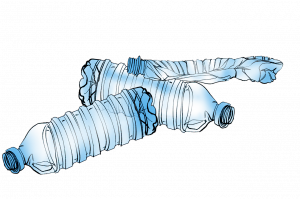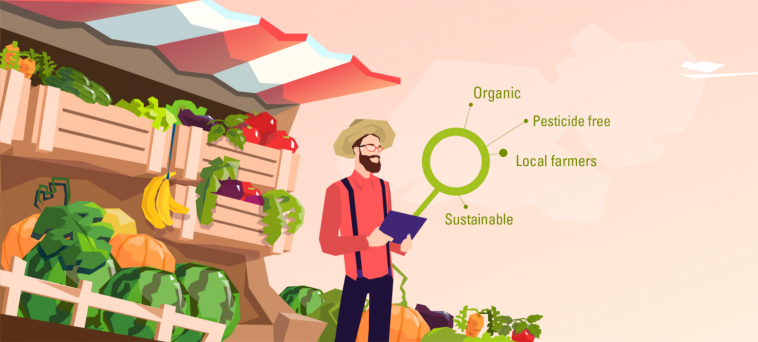Conscious consumption, also known as ethical consumerism, refers to the practice of actively assessing the products, services, and goods that you as a consumer purchase. The main goal in this being to determine the origin of what you are purchasing, where and how it was made or produced, if it was ethically sourced, what company or independent seller you’re supporting, and overall sustainability. The point then being to reflect upon what impacts this has, such as what the environmental or human rights implications of your purchase may be.
This practice largely comes down to voting with your dollar, essentially choosing which businesses or industries you want to support based on their values and business practices.
For example, when looking for a specific product you need to buy, it may become apparent that Company A mistreats their workers or is responsible for a great deal of environmental damage in producing that product, while Company B, making a similar product, uses ethically sourced materials and utilizes more eco-friendly practices. In this case, you as the consumer choose which company is better to give your business to according to your own principles and values.
The exact nature of Conscious Consumption can of course vary a great deal based on subjectivity and where each individual consumer draws their line on ethics, morality, and personal responsibility.
However, regardless of exactly where you stand on certain issues, it is important to understand how your choices can potentially impact fellow humans and the planet and try to make sure you at least know the facts on which you base your decisions.
Some Factors to Consider as a Conscious Consumer
Environmental Sustainability
There are several aspects of how items being produced or how they are sold can have impacts on the environment, whether it be food or commercial goods, and many ways in which you as the consumer can choose to reduce your ecological footprint.

Food Production and Supply Chain: Being conscious of how your food is produced and where it comes from can play the largest role in making sustainable choices. Many industrial or large-scale farming practices are unsustainable long-term and can lead to a variety of issues.
Large monocultures destroy a landscape’s ability to support biodiverse habitats, vital forest habitat can be clearcut to make pasture for grazing livestock, and excessive use of herbicides and pesticides can seep into water systems and kill a great deal of native plants and animals as unintended collateral damage.
Sourcing your meat and produce so you know exactly where it’s coming from can be a great way around this. There are no shortages of organic farms or farms that practice regenerative agriculture, which use more sustainable methods, to choose from locally. You can read more about the benefits of regenerative farming practices here!
As an added bonus to this, buying more food locally not only stimulates the local economy, but means less fuel is required to transport goods long distances, in turn meaning fewer carbon emissions are produced.
Single-use plastic: These types of plastics cause a variety of issues for the environment as well as human health in the longterm. The elimination or reduction of personal dependence on it can also be a very simple step to implement in your consumption of goods.

Buying loose items in bulk rather than pre-wrapped goods, which can use a huge amount of styrofoam or plastic wrap that ultimately goes straight to landfill, can have a big impact. Likewise, bringing your own reusable bags when going shopping instead of relying on plastic shopping bags can contribute dramatically to reducing the plastic required for your personal needs.
Upcycling: We live in a society that encourages the excessive consumption of products. However, there are many ways to reuse or find new purposes for old items, such as clothing, electronics, or appliances, rather than discarding them and buying new ones. This creates less demand for production, which in turn means less pressure on resources. Good for your wallet and good for the planet.
Human Rights
Many companies, particularly large-scale corporations, have been found to be responsible for varying degrees of infringement upon basic human rights or equitable treatment for their workers.
This could range from not paying their employees a sufficient living wage, to a much more problematic issue, such as exploiting child labour in developing countries and the large range of human rights violations within industries can indeed be difficult to trace and uncover for each product you are looking to purchase ethically.

The industries for everyday items such as chocolate and coffee are in fact notorious for the exploitation of the workers who harvest the very products that yield them massive profits. Making it especially important to read labels and research companies.
There are many labels added to products, such as “fair trade”, that denote ethical production methods and it can sometimes be difficult to determine the implications of each one. It can be helpful to reference what those labels mean and which ones to trust.
–
Realistically being conscientious of every single factor that could be potentially detrimental can be quite a task. The main goal isn’t to be hyper-aware of each and every choice you make but limit your personal negative impacts as much as possible, wherever possible. Eventually, with time and the right knowledge, it just becomes second-nature!
You as the consumer have the power to choose what you want to support and use your spending power to influence the change you want to see, no matter how small that may be. However, the more people that start to think this way, the more impactful those positive changes will become!



GIPHY App Key not set. Please check settings